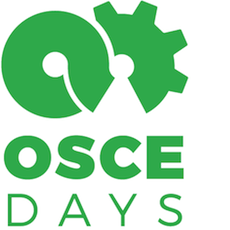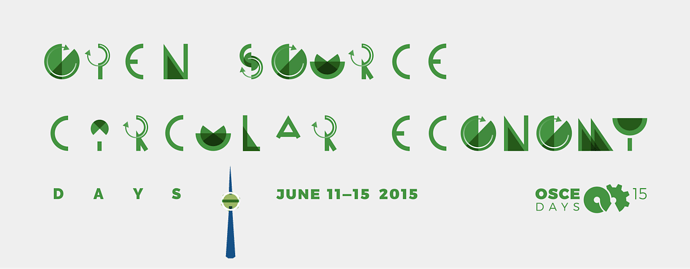What’s happening?
15.6.2015 16:15 start, welcome, thanks to Agora, Alice introduces the concept of oscedays.
Berlin focus was on waste management and textiles.
OSCEdays is a self-organized community of local hubs, online and offline in 35 cities.
1500 tweets, 240 users in the forum, 1384 entries into the forum
What is circular economy? Today we mainly have linear business models, from mining or grwoing ressources, production, consumption and then piling up as waste.
in order to make this more circular we focus on trends like sharing, borrowing, but also digitalization and start-up culture.
we want to work creatively and collaboratively on this.
we’re looking forward to continuity, working throughout the year, and meet again next year.
Lar: what is open source?
everything will be turned into a podcast to listen to later.
we need new techniques to develop circular economies. for this open source is a very useful tool: share information detailed and practical necessary to enable others to replicate and improve. OS means to document not only the plan how to build things, but also the way how we get there (what we tried and what worked/ didn’t work).
16:24 begin of the panelist introduction
Anna: global reporter
impressions from the gloabl osce community, so many challenges and projects were done and started, from very abstract to very practical (e.g. making jams).
London: new cosmetics packaging, Helsinki big event with more than 100 people on Shoer loop to reduce heating engery and wtaer consumption.
Challenges have influenced each other: Chennai used Helsinki Hack of Monopoly game to invent a new game on recycling.
Feedback from many cities: Super platform for exchange and collaboration
22 interviews with different cities can be found online.
Stefan Cusa (IBM): what is the role of circular economy and OS?
IBM has been involved in OS, are there ideas to develop circular economy.
have been active up to 120 software projects, e.g. in Apache, in the past ten years. For us OS is mainly in the area of software, with a collaborative apporach.
Started the open power initiative to develop a processor in a shared effort that will then be used by different partners.
for circular economy we can provide platforms to enable process analyses, communication…
key is open standards, not only OS
how can we provide machines with sensors to tell exactly which parts needs to be serviced or replaced: less unnecessary maintenance and exchange of whole machinery
OS is not the driver for open standards, but it can help to show potentials. Open standrads are agreed upon when several players see their specific use.
waste management needs to use technology 4.0
Patric Durant (Veolia)
challenge: decentralized rainwater recycling, wastemanagement 2.0
which opportiunities does Veolia see in OS
after 6 hours of OS try to sum up: they didn’t manage to develop a rainwater collection tub for all households, so they use the ideas of the OS community, future work with associations and OS community
Chrishan, Projektwerkstatt TU: how can we use rainwater in Berlin? Can we apporach Veolia with our projects?
There was an idea to promote this between associations an the TU, so you’re welcome to come, but there should be a broader platform.
Textile challenge:
how can we make textiles more circular and what is the role of OS in that?
worked for 3 years, interdisziplinary participants, designer, but also scinece, even other cities and spain.
was very inspiring atmosphere, we saw how important it is to share best practise examples: which lighthouse projects are there. tried to develop a visoin for 2050, then worked on a roadmap to get there, the challenge was designed along the life cycle.
Had a lot of knowledge input from ESMO, experts through skype talks, e.g. Amsterdam, integrated that into our knowledge exchange. Very important experience to create that network of exchanging knowledge.
Lars: you’ve been working on transparency, but OS was a new term. Did that add a new dynamics?
Answer: we had a lot of input that we can learn from, it was very enriching.
Chrishan: how do you plan to share your results?
They are shared through the forum so people can not only see but also work
We want to create an OS plaform for textiles to share materials, design strategies, systems, knowledge.
Abdallah Nassur from on waste management.
works to bring knowledge and experience into the
wahat are the solutions and methodologies that can be brought to the MENA region.
what is the potential of OS for your apporach?
started 20 years ago with activities to use environment to bring
we as people can do something, but formost the policians and decision makers have to move, otherwise we cannot do something. how can we sort garbage if there is not facility to collect it? we have to create awareness in the decision makers: they need to understand what waste mangement?
work with almost anyone, we already got a lot moving:
three exaples:
- alumnis, people who studied in Germany and went back to Algeria, tunesia, Syria: there was a great programm of DAAD to find out where did the people go who studied in Germany.
- introduction of waste separation system, collectiong cleanly separated materials.
we want to create jobs. many wars in the world due to social problems, waste management can help to give people a perspective/ jobs. 50% of the jobs come from recycling. if we manage to collect waste cleanly separated, we establish new industries and collection business. German government has seen this and wants to support in various countries.
- waste to energy, not only incineration. We are conerned in the region the waste to use it in the concrete industry. we can build expensive incinerator, or we can use the local industries. we saw with ALBA, cement industry is a target industry. Try to train people for the region.
Maike: did you think about
water is more important than waste. we’re happy about new ideas. if you convince me that this works, we will implement a pilot
water circulation in the mosks, in Jordania, in hotels to support tourism.
Lars: what is the perspective of the green party on OS, shareconomy and circular
OSCE is a good approach to bring in new impulses. As a green party member: reducing waste, shareconomy helps in chaning lifestyle to use less ressources. looking to the golbal south: we have to go ahead in showing a new way, not only demand of others. next: reuse: hwo can we hand on things. cradle to cradel: how can we see things as ressopurces after use, repair café: use longer, have things repairable. That leads to open source: industry 4.0 how can get the crowd to develop OS design, how can we creat things so they we know how to open them and repair them. consumer protection: they need to know what’s in it in a way they can understand. 3. step is then to ask about the role of waste management. urabn mining: can we downscale, have smaller companies? this can be a role of big companies to make it possible, to create better cost/ use ratio. we have to get to a point where the waste companies wee our waste a ressource
LARS: politics is very important to promote what we want to do here. we discussed policy makers, e.g. Stefan Schridde: make a law that any company that stops production of something have to open source
- in Germany recycling has manged to finance itself, e.g. with fridges, but gelbe tonne did only do so 60%
be low tech initiative: there’s a cols ong on reduce, reduce, recyle.
what is the basic that we can agree upon.
oh, i’m a economist not environment politician. I think it’s co2 emmisions, we need to get to zero emmissions. we oftern think that the government is too slow. we all wat an optimum living conditions in this cities, but we disagree on how to get there.
Raffeal Kasil, works in the ALBA technic team. worked in MENA-wide network on waste management. comes from BRasil, worked in ASia on electronics waste.
what is your perspective on waste, what could we start with?
I’m impressed with the German system. Visited sorting plants with high technology. work internationally, Oman, Pakistan, Hong Kong: dismanteling and sorting electrical waste. build a plant in China, train people,
circular ecenomy is difficult to implement on this international scale. first recycling plant for e-waste in China. bring sorting technology, thereS# a parallel market for e-waste, people collect anythign that is of value. similar problems in Brasil and MENA-region, only 5% recycling, a lot of deponie. how can we adapt German techbology to the region, respect cultural differences, how do local partners, local society, how can we create knowledge transfer. working long term, slowly, bring people here, show the plnts and ask: how can we use this mentality and concept that you see in Germany?
Chris: is it possible to creat quick results to ship a german style facitly there?
we have a contract for 12 years, but it can work later, this depends on the market, on the satisfaction of our partners. you cannot ship the facilities to Hong Kong, the situation there is different, it has to be adapted to suit local needs and situation.
its a matter of scale: on seychelles there is a waste ship to work on recycling because it’s small.
we have capacities in Germany for toxic and dangerous waste. we offer service worldwide to bring them to Germany, Basel to safely deposit and recyclen them.
Lars: in Shenzhen there was a OSCEdays group working on e-waste. they want to build onto the informal sector that collect e-waste components that are sold at daytime the private market, and at night there is an industry, feeding the maker scene, using the waste of others to build the models we need, e.g. mobiles with 2 sims. Interview on OSCE youtube channel, david lee. second city with contacts to politics, they had special opening ceremony.
Uwe kleinert Coca Cola:
- what is you perspective on OS and cirular ecenomy?
its important because we all know that ressources are finite. for us big issue water, e.g. in Jordan. packaging, reuse, GDR zero.-system, mehrwegsystem. don’t want waste, grüne punkt, werstoff gesetz. not only recycling but also recycled materials. not so easy because it need s to be safe for foodstuff, recycle PET is in high demand, today it#s expensive. renewable rwa material, bio-plastics. still at the beginning, now produced from sugar, later bio waste, then algae.
not specialist in open source, we work a lot in cooperation, cooperate with car industry and heinz ketchup to create demand for bioplastic and use/ share knowledge. Not really OS but sharing.
we helped to bring PET-bottles to the market by sharing with our competitors.
- doesn’t coke what to retreat from mehrweg?
Coca Cola: this is not true in general, only for two types. mehrweg is slightly lower, coke is basically the only one left in the market of non-alc beverages.
difficulty to get the material in the right quality.
- do you collaborate with the recycling industry in order to get better availability?
Coca Cola:
PET is very versatile, there’s a lot of uses. tried to cooperate REWE, LIDL. It’s a matter of prices, e.g.China buys a lot, then there’s nothing left.
we have a percentage of 18%, we try 100%, but it’s technically not that easy.
others have only 17%, coke has more than aoll others
create demand, e.g. a supply chain for plant bottle. cooperate with Heinz to create a critical mass.
Lars: on the OSCEdays we managed a ratio of 50/50 men and women, OS is more technical and often male dominated, sustainability is more female, bringing both together we manage to create a balance.
(Transitionmaike will finish this translation in a proper way whith the help of the poscast next week)


